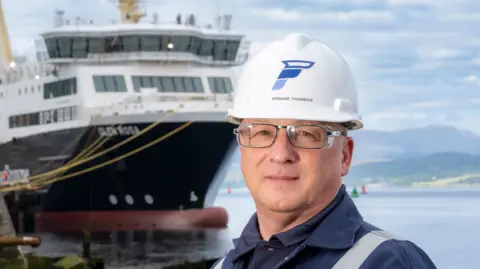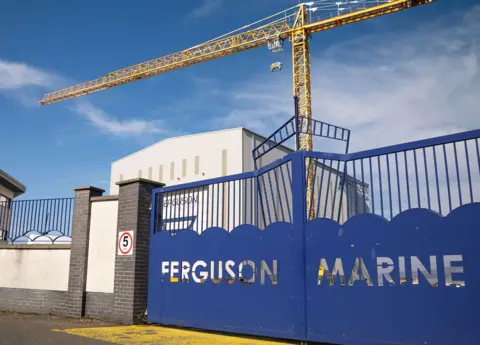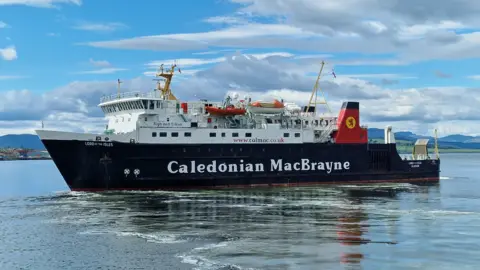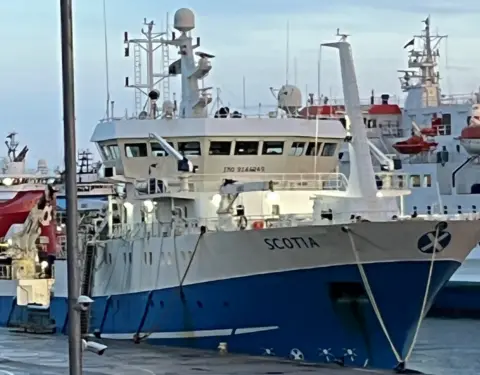Shipyard boss calls for direct award of new ferry
 Ferguson Marine
Ferguson MarineThe new boss of Ferguson Marine has called for a new CalMac ferry order to be directly awarded to the state-owned shipyard to secure its survival.
Graeme Thomson said the replacement for MV Lord of the Isles was a target contract for the Port Glasgow yard which has no ship orders once MV Glen Rosa is completed next summer.
If direct award is not possible, he told a committee of MPs that "social value" should be included in the assessment of bids in order to create a "level playing field" with overseas rivals.
He said it would be "very difficult" and "very challenging" to sustain the current workforce unless the yard secures the new order.
The Port Glasgow shipyard recently signed a deal for subcontracting work building units for the frigate HMS Birmingham under construction by BAE Systems in Glasgow, but the new work is not in itself enough to guarantee the yard's future.
He said it was actively pursuing a number of opportunities, but singled out the planned replacement for MV Lord of the Isles, an 85m (276ft) CalMac ferry built by Ferguson's 35 years ago, which normally serves South Uist.
The Scottish government has said it has earmarked funding for the contract, but ferries agency CMAL is awaiting the go-ahead to begin the procurement.
The Ferguson shipyard, which employs about 300 people, suffered a major blow earlier this year when an important order for seven small electric ferries for CalMac, worth £160m, went to the Polish firm Remontowa.
Mr Thomson said he had been told by CMAL the Ferguson bid did well in the technical evaluation but could not match the overseas yard on price.
He told the committee: "We're OK with competition as long as we're playing on a level playing field.
"As long as a situation prevails where international yards can do it cheaper than us because of the tax breaks, the labour rates, whatever, then we'll never be playing on a level playing field."
'Race to the bottom'
Earlier an industry body told the committee that overseas yards enjoyed more state support and cheaper labour costs, often able to undercut UK yards by 10-20%.
The UK's refreshed national shipbuilding strategy has called for a minimum 10% social value element in public tenders to offset that.
But CMAL, which is owned by the Scottish government, has said it did not include social value in the scoring for the small vessels contract because it was worried about a possible legal challenge.
Deputy First Minister Kate Forbes had earlier ruled out a direct award of that contract, also citing legal risks.

Mr Thomson said public procurement needed to "move away from a race to the bottom in terms of price" to a model that recognised the economic and social benefits of building ships in the UK.
"We are lobbying for a shift in emphasis on UK local content and even whether we can get direct award," he said.
The Scottish government said direct award was only permissible in limited circumstances but that each contract would be considered on a "case-by-case basis".
A spokesperson said: "Shipbuilding is a competitive global market and any direct award of a public contract must comply with procurement rules and be capable of withstanding legal challenge."
Scottish Conservative transport spokeswoman Sue Webber blamed the SNP for the yard's difficulties but said islanders would be alarmed at the prospect of the shipyard being entrusted with the new ferry contract.
"Not another penny of taxpayers' money should be poured down the drain," she said.
 Christopher Brindle
Christopher BrindleMr Thomson, who took up his post in May, accepted that huge overspends and delays with two dual-fuel LNG CalMac ships had harmed the yard's reputation.
He said it now needed to "demonstrate delivery" to restore confidence, and once a new order was secured it would draw down £14.2m of new investment promised by Scottish ministers.
Some of the planned equipment could reduce the labour time required for steelwork by 30-40%, he said, and would make the yard more competitive.
He described the two overbudget ships MV Glen Sannox and MV Glen Rosa as prototypes whose problems had arisen from a "bespoke set of circumstances".
These included poor planning and an ill-advised "rush to get busy" before there was a mature design in place, he said.
But he said the skills of the Ferguson workforce were no different from other more successful yards such as Babcock, where he previously worked, and BAE Systems.
He said he saw the yard's future in building ships between 60 and 80m in length, much smaller than dual fuel ships which are 102.5m (335ft) long.
The shipyard could at the same time build smaller vessels, supplemented by subcontracting work on military ships, he added.
What other orders could Ferguson Marine bid for?

Aside from the MV Lord of the Isles replacement there are several publicly-funded ship procurements in the pipeline which could potentially provide much-needed work for the Ferguson shipyard:
- Phase two of the Small Vessels Replacement Programme will see ferries agency CMAL order three more small electric CalMac ferries.
- The Scottish government has just confirmed it is looking to replace the fisheries protection vessel Minna, and the fishing research vessel Scotia - both previously built by Ferguson's - although no timetable has been given.
- The UK Border Force is looking to replace 11 small vessels, and the UK government has promised they will be built in the UK.
The Ferguson management believes demand for windfarm support ships or lighthouse board vessels could also provide opportunities.
Prior to the ferries controversy, Ferguson's reputation was largely built by focusing on specialised ships, under 100m in length.
